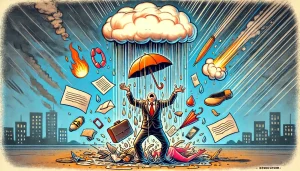Ever had one of those days when everything that could go wrong, does go wrong? That’s exactly what this powerful idiom captures!
When problems or misfortunes come, they often arrive together in overwhelming numbers, similar to how a light rain can suddenly become a heavy downpour.
Have you ever experienced multiple problems hitting you all at once?

This common English idiom perfectly describes that overwhelming feeling when challenges cluster together, just like a sudden storm.
Whether you’re new to idiomatic expressions or looking to enhance your English skills, understanding “When it rains, it pours” will help you express those frustrating moments when life’s difficulties seem to multiply.
In this guide, we’ll explore its origins, practical usage, and how to confidently incorporate it into your everyday conversations.
Introduction



Ever had a morning where everything goes wrong? That overwhelming feeling when problems stack up is exactly what ‘When it rains, it pours’ describes!
Despite its apparent reference to a heavy downpour, the true essence of this expression has nothing to do with actual rain. Instead, it highlights how trouble can arrive in clusters, mirroring the intensity of a sudden storm.
In this blog, we’ll uncover the background of the idiom, discuss practical ways to use it, and explore how visualization can make learning English phrases more engaging.
Additionally, we’ll address a few related expressions, offer example sentences, and finish with a brief quiz to test your understanding.
Key Takeaways
- Idiom Meaning
“When it rains, it pours” describes how problems or challenges often occur simultaneously, just like a sudden downpour. - Practical Usage
Knowing this phrase helps you express that overwhelming sense when events stack up against you in a short period of time. - Confidence Boost
By mastering this idiom, you’ll elevate your English communication skills, especially when discussing everyday mishaps.
Understanding the Idiom
Idiomatic Meaning
At first glance, “When it rains, it pours” might sound like advice to always carry an umbrella. However, in idiomatic usage, it’s about life’s hurdles piling on top of each other:
- Domino Effect: One problem triggers another, creating an avalanche of difficulties.
- Overwhelming Challenges: Similar to a thunderstorm, the issues can feel relentless and hard to manage.
- Real-Life Example: You wake up late, misplace your keys, and then discover your phone is out of battery. Each inconvenience amplifies the stress of the last one.
Literal Meaning
When taken literally, this phrase implies a heavy downpour of rain. Yet the commonly understood meaning in everyday conversation is figurative, focusing on compounded misfortunes rather than weather.
If you were new to English and heard someone say, “It’s one of those days—when it rains, it pours,” you might mistakenly look at the sky, only to realize the speaker was describing their chaotic morning instead of actual rain clouds.
Historical Origins
The expression “When it rains, it pours” is believed to have originated from a clever advertising slogan by Morton Salt in the early 1900s.
The original idea emphasized how Morton’s salt continued to pour freely even in humid or damp conditions, setting it apart from other brands.
Over time, the phrase transcended commercial advertising and became a popular idiom. It started to convey not only the literal meaning of heavy rainfall or free-flowing salt but also the idea that difficulties often cluster together in life.
Visualizing the Idiom
One of the best ways to grasp idioms is to create a mental picture:
- Imagine a Rapid Downpour
Envision light raindrops escalating into a fierce storm. This quick shift in intensity resembles how small mishaps can spiral into a series of mishaps, amplifying stress. - Relatable Scenarios
Picture yourself carefully leaving the house only to rip your shirt, lose your wallet, and get stuck in traffic. Each event seems to invite another disaster. Seeing this scene in your mind makes the idiom more memorable. - Embrace Humor
Consider the irony of bringing an umbrella on a bright, sunny day because you misunderstood the idiom literally. This humorous confusion can actually aid in remembering the true meaning.
Real-Life Scenarios
Life doesn’t always unfold smoothly; often, unforeseen obstacles converge at once. Here are some everyday examples:
- Morning Chaos
- You wake up late.
- Coffee runs out just when you need it most.
- Your car refuses to start.
Lesson: It truly feels like a “When it rains, it pours” moment.
- Workplace Woes
- A tight deadline is looming.
- The computer system crashes unexpectedly.
- An urgent meeting is called by your boss.
Lesson: Work can feel overwhelming when multiple tasks collide.
- Household Disasters
- The washing machine breaks down.
- A pet accidentally causes a mess.
- You find out you forgot to pay a crucial bill.
Lesson: Even small challenges can multiply when they strike all at once.
Similar & Opposite
English offers a variety of idioms and phrases that either mirror the meaning of “When it rains, it pours” or provide an alternative perspective.
Similar Expressions
- “Misfortunes never come singly.”
Emphasizes that problems often arrive in quick succession rather than individually. - “Trouble comes in threes.”
Suggests that if something unfortunate happens, you should brace yourself for at least two more mishaps around the corner.
Opposite Expression
- “Every cloud has a silver lining.”
Reminds us that even in the midst of adversity, there’s a positive element waiting to be discovered. For instance, missing an appointment might lead you to an unexpected opportunity elsewhere.
Example Sentences
Here are several sentences to illustrate proper usage of “When it rains, it pours”:
- Workplace Stress“ My computer crashed, I spilled coffee on my report, and the boss asked for an update an hour earlier than scheduled. When it rains, it pours.”
- Travel Hassles“ My flight was delayed, then my luggage went missing. When it rains, it pours.”
- Everyday Life“ I locked my keys in the car and realized I left my wallet at home. When it rains, it pours.”
- Unexpected Expenses“ First, my refrigerator needed repair. Now, my car requires expensive maintenance. When it rains, it pours.”
- Unfortunate Timing“ The day I forgot my umbrella, a rainstorm hit, and I had an outdoor meeting. When it rains, it pours.”
Pop Quiz: Check Your Idiom Skills
When It Rains, It Pours

Coping Strategies for Stress
Even though this idiom focuses on life’s unfortunate events clustering together, it’s possible to handle them effectively. Consider these tips:
- Stay Organized
Write down each problem and tackle them one by one. This helps avoid feeling swamped. - Practice Mindfulness
Take a moment to breathe and clear your head before moving on to the next task. Panicking often makes the situation worse. - Maintain a Sense of Humor
Sometimes laughter truly is the best remedy. Finding humor in small misfortunes can lighten your mood and relieve stress. - Seek Support
Share your experiences or ask for help from friends, colleagues, or online communities. Communicating can help you find solutions more quickly.
Conclusion
“When it rains, it pours” aptly captures how misfortunes can appear in bunches, sometimes turning an otherwise ordinary day into a whirlwind of stress.
By recognizing when you’re caught in this storm of setbacks, you can take practical steps to manage each issue more calmly. Embracing a bit of humor along the way can make these moments more bearable.
Feel free to bookmark this guide if you ever need a quick refresher on the idiom. Reflect on your own challenging days and see how this expression might fit.
The more you practice and engage with idiomatic language, the more natural it becomes in everyday conversation.



Just remember—when the forecast looks gloomy, keeping a proactive mindset can help you stay grounded, even in the heaviest downpour. You’ve got this!









Comment